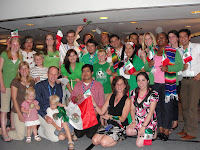So here are some opportunities for you:
A. The Fulbright Classroom Teacher Exchange, in which you swap jobs with another teacher. The exchange is one full school year. Both teachers get paid their home country salary and depending on the country, also receive an additional stipend. People who are looking for a way to build their language skills, challenge themselves as a teacher, and grow as an individual should definitely apply. And you're right to think carefully about the experience: it's not easy, but the rewards are huge. More information is at: http://exchanges.state.gov/globalexchanges/fulbright-teacher-exchange-program.html
B. The Fulbright Distinguished Educator Award. Designed to support educators in pursuing projects of professional interest, this program is a three to six month long placement in another country. Selected educators take university classes and work on a project of their design. Here are two examples of teachers selected: http://www.bostonpublicschools.org/node/3480
C. Fulbright not your cup of tea? Check out these other Department of State programs, designed to engage US citizen with our global community. http://exchanges.state.gov/index.html
 tinues. I stumbled into the hotel lobby at 3 a.m., exhausted yet oddly alert. I love to travel, even if it is across the country on what has become a grueling 11 (or longer!) hour trip with a long layover in Texas due to thunderstorms. But I am back in D.C., my adolescent home-away-from-home, and the site of where I began my Fulbright adventure last year. How much is the same, and how much has changed. The Fulbright should come with a warning label, another Fulbrighter joked once. "Warning: May change your life completely." It sounds glamorous and exciting, but sometimes it's just plain hard.
tinues. I stumbled into the hotel lobby at 3 a.m., exhausted yet oddly alert. I love to travel, even if it is across the country on what has become a grueling 11 (or longer!) hour trip with a long layover in Texas due to thunderstorms. But I am back in D.C., my adolescent home-away-from-home, and the site of where I began my Fulbright adventure last year. How much is the same, and how much has changed. The Fulbright should come with a warning label, another Fulbrighter joked once. "Warning: May change your life completely." It sounds glamorous and exciting, but sometimes it's just plain hard.






